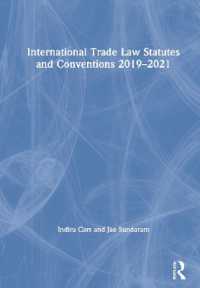- ホーム
- > 洋書
- > 英文書
- > History / World
Full Description
This collection examines practical and ethical issues inherent in the application of oral history and memory studies to research about the Soviet Union and Eastern Europe since the collapse of the Soviet bloc. Case studies highlight the importance of ethical good practice, including the reflexive interrogation of the interviewer and researcher, and aspects of gender and national identity.
Researchers use oral history to analyze present-day recollections of the Soviet past, thereby extending our understanding beyond archival records, official rhetoric and popular mythology. Oral history explores individual life stories, but this has sometimes resulted in rather incomplete, incoherent, inconsistent or illogical narratives. Oral history, therefore, presents the researcher with a number of methodological and ethical dilemmas, including the interpretation of "silence" in biographical accounts.
This collection links the discussion of oral history ethics with that of memory studies. Memories are shaped by factors that may be, simultaneously, both consecutive and disrupted. In written accounts and responses to interview questions, respondents sometimes display nostalgia for the Soviet past, or, conversely, may seek to de-mythologize the realities of Soviet rule. Case studies explore what to do when interview subjects and memoirists consciously, sub-consciously or unconsciously "forget" aspects of their own past, or themselves seek to take control of the research process.
Contents
Introductions Introduction: From Interview to Life Story: Methodology and Ethics in Oral History Melanie Ilic Introduction: Silence in Biographical Accounts and Life Stories: The Ethical Aspects of Interpretation Dalia Leinarte Part I: Russia 1. Interview with Anastasia Posadskaya: May 1995 Barbara Engel 2. Women's Everyday Life in Soviet Russia: Collecting Stories, Dealing with Silences and Exploring Nostalgia Yulia Gradskova 3. Interview as Conversation: Agency and Self-Construction in a Russian Rural Woman's Story of Courtship and Marriage Laura J. Olson Part II: Baltic States 4. The Paradoxes of Family Life Trajectories in Soviet and Post-Soviet Life Strategies Ingrida Gečienė 5. Research Ethics in Soviet Memory Studies Sigita Kraniauskienė and Laima Žilinskienė 6. "Not Much Love Lost Between Me and My Husband": Love in Estonian Women's Life Stories of the Soviet Period Leena Kurvet-Käosaar 7. History, the Remembered Past and Master Narratives: The Latvian Case Andrejs Plakans 8. Recycling Archival Sources and Oral History: The Nationalization of Private Housing in Soviet Latvia Maija Runcis 9. Three (Un)Successful Cases of the Application of Oral History Methods Aurimas Švedas Part III: East Central Europe 10. Self-Sacrificing Motherhood: Reconciling Traumatic Life Experiences of Hungarian Collectivisation Ildikó Asztalos-Morell 11. "We Had to Become Criminals to Survive Under Communism!": Testimonies of Petty Criminality and Everyday Morality in Late Socialist Central Europe Kelly Hignett 12. Female Voices of Post-War Forced Displacement Karolina Koziura and Olena Lytovka, with Melanie Ilic








